by doing sth.结构谈介词by的用法
第18讲 介词by的用法及其扩展-【暑假衔接】2021年新九年级英语暑假精品知识点(人教版)
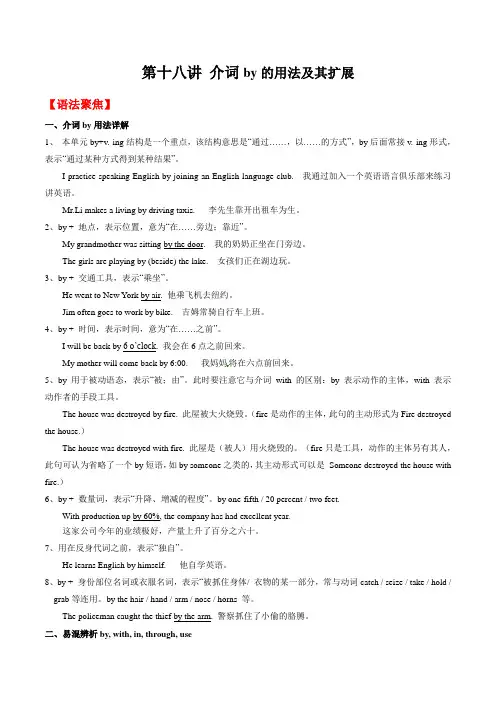
第十八讲介词by的用法及其扩展【语法聚焦】一、介词by用法详解1、本单元by+v.-ing结构是一个重点,该结构意思是“通过……,以……的方式”,by后面常接v.-ing形式,表示“通过某种方式得到某种结果”。
I practice speaking English by joining an English-language club. 我通过加入一个英语语言俱乐部来练习讲英语。
Mr.Li makes a living by driving taxis. 李先生靠开出租车为生。
2、by + 地点,表示位置,意为“在……旁边;靠近”。
My grandmother was sitting by the door. 我的奶奶正坐在门旁边。
The girls are playing by (beside) the lake. 女孩们正在湖边玩。
3、by + 交通工具,表示“乘坐”。
He went to New York by air. 他乘飞机去纽约。
Jim often goes to work by bike. 吉姆常骑自行车上班。
4、by + 时间,表示时间,意为“在……之前”。
I will be back by 6 o’clock. 我会在6点之前回来。
My mother will come back by 6:00. 我妈妈将在六点前回来。
5、by 用于被动语态,表示“被;由”。
此时要注意它与介词with的区别:by 表示动作的主体,with 表示动作者的手段工具。
The house was destroyed by fire. 此屋被大火烧毁。
(fire是动作的主体,此句的主动形式为Fire destroyed the house.)The house was destroyed with fire. 此屋是(被人)用火烧毁的。
(fire只是工具,动作的主体另有其人,此句可认为省略了一个by短语,如by someone之类的,其主动形式可以是Someone destroyed the house with fire.)6、by + 数量词,表示“升降、增减的程度”。
英语重点句型及如何使用
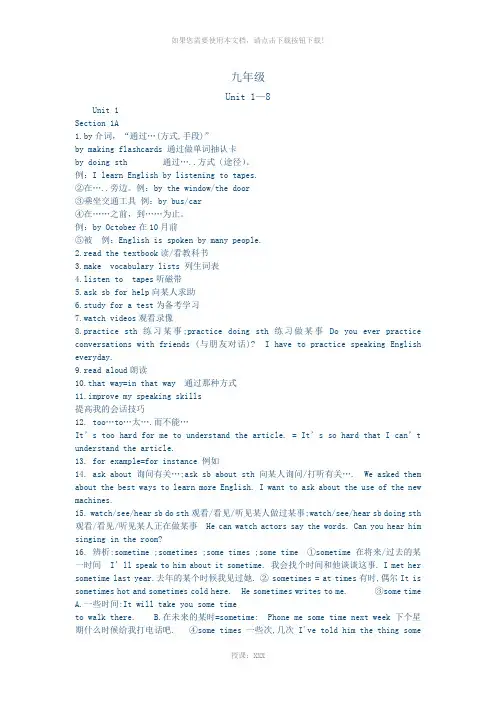
九年级Unit 1—8Unit 1Section 1A1.by介词,“通过…(方式,手段)”by making flashcards 通过做单词抽认卡by doing sth 通过…..方式(途径)。
例:I learn English by listening to tapes.②在…..旁边。
例:by the window/the door③乘坐交通工具例:by bus/car④在……之前,到……为止。
例:by October在10月前⑤被例:English is spoken by many people.2.read the textbook读/看教科书3.make vocabulary lists 列生词表4.listen to tapes听磁带5.ask sb for help向某人求助6.study for a test为备考学习7.watch videos观看录像8.practice sth练习某事;practice doing sth练习做某事Do you ever practice conversations with friends (与朋友对话)? I have to practice speaking English everyday.9.read aloud朗读10.that way=in that way 通过那种方式11.improve my speaking skills提高我的会话技巧12. too…to…太….而不能…It’s too hard for me to understand the article. = It’s so hard that I can’t understand the article.13. for example=for instance 例如14. ask about询问有关…;ask sb about sth向某人询问/打听有关…. We asked them about the best ways to learn more English. I want to ask about the use of the new machines.15. watch/see/hear sb do sth观看/看见/听见某人做过某事;watch/see/hear sb doing sth观看/看见/听见某人正在做某事 He can watch actors say the words. Can you hear him singing in the room?16. 辨析:sometime ;sometimes ;some times ;some time ①sometime在将来/过去的某一时间I’ll speak to him about it sometime. 我会找个时间和他谈谈这事. I met her sometime last year.去年的某个时候我见过她. ② sometimes = at times有时,偶尔It is sometimes hot and sometimes cold here. He sometimes writes to me. ③some time A.一些时间:It will take you some timeto walk there. B.在未来的某时=sometime: Phone me some time next week下个星期什么时候给我打电话吧. ④some times一些次,几次 I've told him the thing sometimes.17. join短语:①join sb加入到某人的活动中去②join in+活动项目"参加…活动" I'd like to join in the game. ③join+组织机构"加入到某个组织机构,成为其中的一个成员"join the Party; join the League, The best way to improve your English is to join an English club18. have fun 玩得高兴19. not at all 一点也不20. get excited 高兴、激动21. end up (vi.) 结束; 告终; 结果 ; 最后end up doing sth.We end up taking a taxi there .我们结果乘出租车去了那里. We sometimes end up speaking in Chinese.(以说汉语结束对话)22. do a survey 做调查;do a survey about针对…做调查 I'm doing a survey about learning English. 我在进行学习英语的调查。
人教版英语九年级全一册Unit1【刷语法】(重点语法提升练)一册单元模块满分必刷题(人教版) 含答案
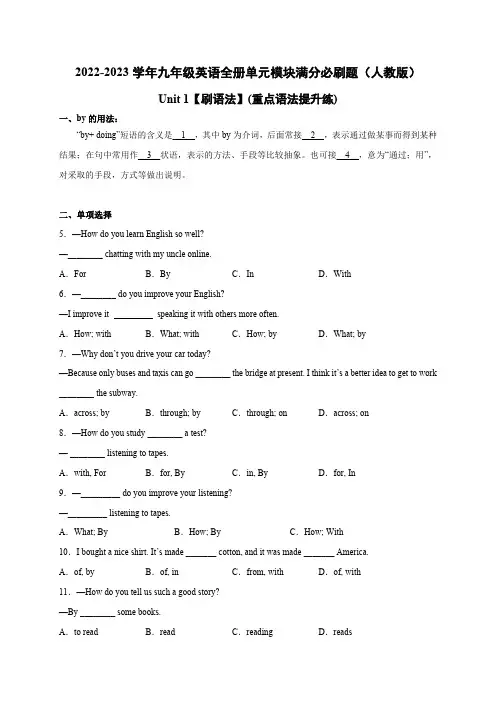
2022-2023学年九年级英语全册单元模块满分必刷题(人教版)Unit 1【刷语法】(重点语法提升练)一、by的用法:“by+ doing”短语的含义是__1__,其中by为介词,后面常接__2__,表示通过做某事而得到某种结果;在句中常用作__3__状语,表示的方法、手段等比较抽象。
也可接__4__,意为“通过;用”,对采取的手段,方式等做出说明。
二、单项选择5.—How do you learn English so well?—________ chatting with my uncle online.A.For B.By C.In D.With6.—________ do you improve your English?—I improve it speaking it with others more often.A.How; with B.What; with C.How; by D.What; by7.—Why don’t you drive your car today?—Because only buses and taxis can go ________ the bridge at present. I think it’s a better idea to get to work ________ the subway.A.across; by B.through; by C.through; on D.across; on8.—How do you study ________ a test?— ________ listening to tapes.A.with, For B.for, By C.in, By D.for, In9.—_________ do you improve your listening?—_________ listening to tapes.A.What; By B.How; By C.How; With10.I bought a nice shirt. It’s made _______ cotton, and it was made _______ America.A.of, by B.of, in C.from, with D.of, with11.—How do you tell us such a good story?—By ________ some books.A.to read B.read C.reading D.reads12.— ________ do you learn English well?—I learn it ________ asking the teacher for help.A.How; at B.What; by C.What; with D.How; by13.I often go to school ________ foot, but I had to go to school ________ taxi this morning because of rain.A.by; by B.on; in C.with; on D.on; by14.― What is the secret ________ English study?― ________ reading lots of English articles, you can improve it a lot.A.with; About B.to; About C.with; By D.to; By15.It takes about thirty minutes from my home to school ______.A.to by underground B.by the undergroundC.to on underground D.on the underground16.The disabled boy paints very well _______ his left hand. He can do this _______ practicing painting for several hours a day.A.with; in B.by; with C.with; by17.Jim doesn’t get to school ________ bike. He usually gets________ his father’s car.A.on, by B.by, by C.by, in D.on, in18.It’s reported that the victim was wounded ________ a knife _______ a short, fat man.A.by; with B.with; by C.for; to D.to; for19.— does she study English?— with a group.A.How; By working B.How; In workingC.How often; For work D.What; At work20.—Are your shirts made __________ cotton?—Yes, and they are made __________ China.A.by; in B.of; in C.with; by D.from; with21.---congratulations_________ you_______ your success.----Thank you. We will celebrate_________ it_______ holding a party.A.to;for;on;by B.to;on;/;by C./;on: to;for D./;on;for;by22.I made the coat ________ my own hands. It was made ________ hand not with a machine.A.in; in B.in; with C.with; by D.with; with23.— Your sweater looks nice. Is it made __________ cotton?— Yes, and it was made __________ Shanghai.A.of; by B.of; in C.from; by D.from; in24.—How do you study _________ a test?一I study _________ working with a group.A.for;as B.by;for C.for;by D.for;for三、根据提示,用含有by的短语完成下列各题25.Come and sit _______________________________(我旁边).26._______________________________(到上星期日)I had finished the book.27.She came home _______________________________(乘飞机).28.Did you make the desk _______________________________(自己独自)?29._______________________________(顺便问一下), how many people are there in your family? 30.It has been turned into water _______________________________(受热).31._______________________________(不久以后), more and more people began to study English. 32.The Great Wall was built _______________________________(用手).33.Then _______________________________(逐渐地), the smoke grew heavier and thicker until finally it turned into a terrible Genie.34.If your son feels well enough to watch TV _______________________________(到那时), he’ll be fine after the game.四、完成句子。
2020人教新目标版九年级英语上unit1单元知识点(短语+句型+重难点句子+语法)
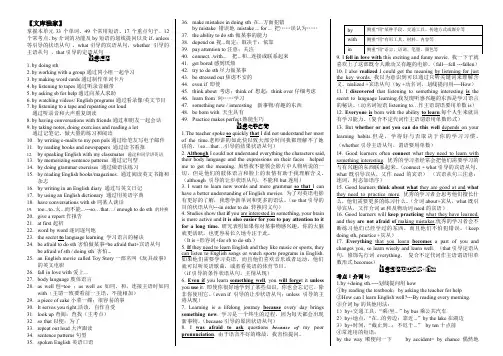
【文库独家】掌握本单元33个单词、49个常用短语、17个重点句子、12个常考点。
by介词的功能及by短语的划线提问以及if、unless 等引导的状语从句,what引导的宾语从句,whether 引导的主语从句,that引导的定语从句重点短语1.by doing sth2.by working with a group通过同小组一起学习3.by making word cards通过制作单词卡片4.by listening to tapes通过听录音磁带5.by asking sb for help通过向某人求助6.by watching videos/ English programs通过看录像/英文节目7.by listening to a tape and repeating out loud通过听录音和大声重复朗读8.by having conversations with friends通过和朋友一起会话9.by taking notes, doing exercises and reading a lot通过记笔记、做大量的练习和阅读10.by writing e-mails to my pen pals通过给笔友写电子邮件11.by reading books and newspapers 通过读书看报12.by speaking English with my classmates 通过和同学讲英语13.by memorizing sentence patterns 通过记句型14.by doing grammar exercises 通过做语法练习15.by reading English books/magazines. 通过阅读英文书籍和杂志16.by writing in an English diary 通过写英文日记17.by using an English dictionary 通过用英语字典18.have conversations with sb同某人谈话19.too...to..太...而不能...---so…that…/ enough to do sth 的转换20.give a report作报告21.at first起初22.word by word逐词逐句地23.the secret to language learning 学习语言的秘诀24.be afraid to do sth害怕做某事=be afraid that+宾语从句be afraid of sth / doing sth 害怕…25.an English movie called Toy Story一部名叫《玩具故事》的英文电影26.fall in love with爱上...27.body language肢体语言28.as well也=too ;as well as 如同、和,连接主语时如同with(主谓一致要看前一主语,不能相加)29. a piece of cake小菜一碟;很容易的事30.It serves you right.活该,自作自受31.look up查阅;查找(主考点)32.so that以便;为了33.repeat out loud大声跟读34.sentence patterns句型35.spoken English英语口语36.make mistakes in doing sth 在...方面犯错by mistake 错误地mistake … for …把……误认为……37.the ability to do sth做某事的能力38.depend on视...而定;取决于;依靠39.pay attention to注意;关注40.connect...with... 把...和...连接或联系起来41.get bored感到厌烦42.try to do sth尽力做某事43.be stressed out焦虑不安的44.even if 即使45.think about 考虑;think of 想起;think over仔细考虑46.learn from 向……学习47.something new / interesting 新事物/有趣的东西48.be born with 天生具有49.Practice makes perfect.熟能生巧重点句子必背1.The teacher spoke so quickly that I did not understand her mostof the time.老师讲的如此快以致大部分时间我都理解不了她讲的。
九年级英语第一单元知识点
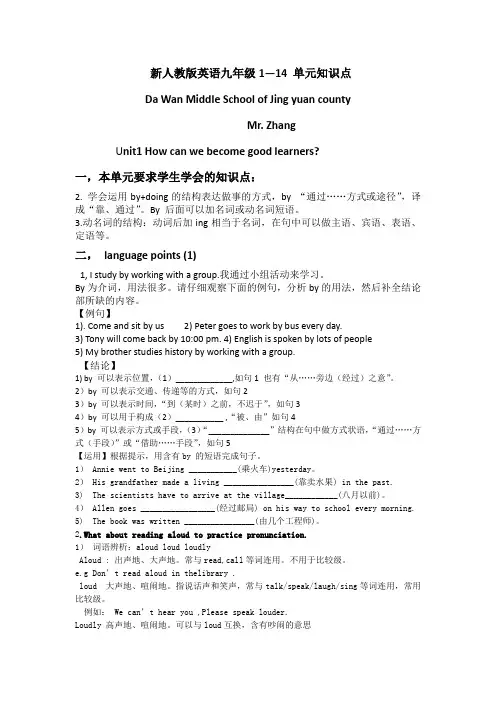
新人教版英语九年级1—14 单元知识点Da Wan Middle School of Jing yuan countyMr. ZhangU nit1 How can we become good learners?一,本单元要求学生学会的知识点:2. 学会运用by+doing的结构表达做事的方式,by “通过……方式或途径”,译成“靠、通过”。
By 后面可以加名词或动名词短语。
3.动名词的结构:动词后加ing相当于名词,在句中可以做主语、宾语、表语、定语等。
二,language points (1)1, I study by working with a group.我通过小组活动来学习。
By为介词,用法很多。
请仔细观察下面的例句,分析by的用法,然后补全结论部所缺的内容。
【例句】1). Come and sit by us 2) Peter goes to work by bus every day.3) Tony will come back by 10:00 pm. 4) English is spoken by lots of people5) My brother studies history by working with a group.【结论】1) by 可以表示位置,(1)_____________,如句1 也有“从……旁边(经过)之意”。
2)by 可以表示交通、传递等的方式,如句23)by 可以表示时间,“到(某时)之前,不迟于”,如句34)by 可以用于构成(2)___________ ,“被、由”如句45)by 可以表示方式或手段,(3)“______________”结构在句中做方式状语,“通过……方式(手段)”或“借助……手段”,如句5【运用】根据提示,用含有by 的短语完成句子。
1) Annie went to Beijing ___________(乘火车)yesterday。
介词by的用法总结
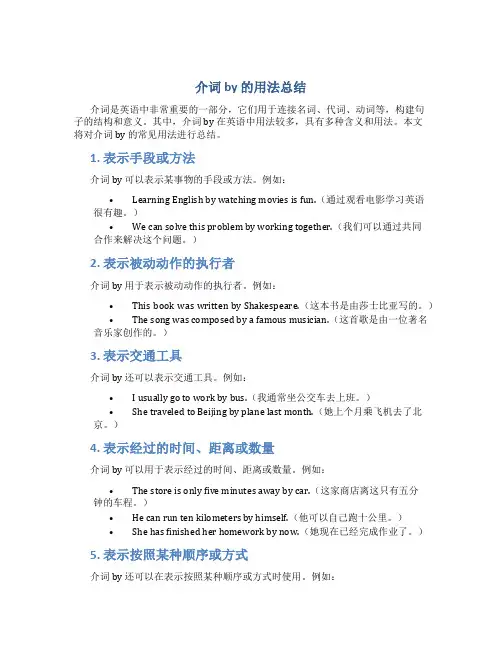
介词 by 的用法总结介词是英语中非常重要的一部分,它们用于连接名词、代词、动词等,构建句子的结构和意义。
其中,介词 by 在英语中用法较多,具有多种含义和用法。
本文将对介词 by 的常见用法进行总结。
1. 表示手段或方法介词 by 可以表示某事物的手段或方法。
例如:•Learning English by watching movies is fun.(通过观看电影学习英语很有趣。
)•We can solve this problem by working together.(我们可以通过共同合作来解决这个问题。
)2. 表示被动动作的执行者介词 by 用于表示被动动作的执行者。
例如:•This book was written by Shakespeare.(这本书是由莎士比亚写的。
)•The song was composed by a famous musician.(这首歌是由一位著名音乐家创作的。
)3. 表示交通工具介词 by 还可以表示交通工具。
例如:•I usually go to work by bus.(我通常坐公交车去上班。
)•She traveled to Beijing by plane last month.(她上个月乘飞机去了北京。
)4. 表示经过的时间、距离或数量介词 by 可以用于表示经过的时间、距离或数量。
例如:•The store is only five minutes away by car.(这家商店离这只有五分钟的车程。
)•He can run ten kilometers by himself.(他可以自己跑十公里。
)•She has finished her homework by now.(她现在已经完成作业了。
)5. 表示按照某种顺序或方式介词 by 还可以在表示按照某种顺序或方式时使用。
例如:•Sort the books on the shelf by author’s last name.(按照作者姓氏给书籍排序。
Unit 1 How can we become good learners知识点整理
Unit 1 How can we become good learners?语法一.介词by的用法1.by意为“通过”,其后常接名词或动词-ing形式。
用来表示“以、通过、用(某种方法或手段)”而达到某种预期的目的,常用来回答how引导的特殊疑问句。
by doing sth意为“通过做某事”—How does the boy improve his spoken English?—By talking with a foreigner.(1)—How do you learn English so well?—chatting with my uncle in America online.A. ByB. WithC. InD.And(2)Jackson studied Chinese by __________ tapes.A. listeningB. to listenC. listening toD. to listening to2.by+时间,意为“不迟于,在……之前”I have to go to bed by ten o’clock.3.by+地点,意为“在……旁”Jim sat down by the window.4.by+交通工具,意为“乘……”I go to school by bike.5.由by构成的固定短语:by the way顺便说一下by oneself独自=alone二.现在完成时的用法(一)用法:1.表示过去发生的某一动作或状态对现在造成的影响或结果.常用的标志词有already(“已经”,用于肯定句),yet(“还,已经”,用于否定句和疑问句),ever (“曾经”),never(“绝不,从不”),just(“刚刚”),before(“以前”),once (“一次”),twice(“两次”).I have already eaten the dinner.(说明我现在饱了)。
2020人教九年级英语单元语法聚焦一(答案)
单元语法聚焦一by的用法介词by的含义很多,本单元中的by doing sth结构是其重要用法之一。
1.by doing sth表示“通过某种途径(方法)”;此介词短语作方式状语,用于回答以how提问的句子。
—How do you learn new words, Jane?简,你怎样学习生词?—By making word cards.通过制作单词卡片。
2.“by+交通工具名词”表示“乘坐某种交通工具”,相当于“on/in+冠词/形容词性物主代词+交通工具名词”。
by bus 坐公交车by train 坐火车by subway 坐地铁by taxi 坐出租车by plane 坐飞机by ship 坐轮船3.介词by的其他含义和用法4.介词by的固定搭配day by day 一天天bit by bit 一点一点地by accident 偶然by mistake 错误地;无意中one by one 逐个地;逐一地by the end of… 到……末为止by the time 到……的时候Ⅰ.单项选择()1.2018·河池改编You can improve your English ________ listening to English songs.A.by B.for C.in()2.2018·青岛改编More and more people in Qingdao go to work ________ subway now.A.on B.in C.by()3.The teacher was standing________ the window while the students were doing their homework quietly.A.for B.on C.by()4.The classroom was cleaned ________ Lucy just now.A.for B.by C.to()5.You have to get home ________ 10 o'clock.A.with B.on C.byⅡ.根据汉语意思完成句子1.我父亲经常坐公交车去上班,我总是步行去上学。
介词in,on.at,for.with,by,of的基本用法
介词用法知多少介词是英语中最活跃的词类之一。
同一个汉语词汇在英语中可译成不同的英语介词。
例如汉语中的“用”可译成:(1)用英语(in English);(2)用小刀(with a knife);(3)用手工(by hand);(4)用墨水(in ink)等。
所以,千万不要以为记住介词的一两种意思就掌握了这个介词的用法,其实介词的用法非常广泛,搭配能力很强,越是常用的介词,其含义越多。
下面就简单介绍几组近义介词的用法及其搭配方法。
一. in, to, on和off在方位名词前的区别1. in表示A地在B地范围之内。
如:is in the southeast of .2. to表示A地在B地范围之外,即二者之间有距离间隔。
如:lies to the east of .3. on表示A地与B地接壤、毗邻。
如:is on the east of .4. off表示“离……一些距离或离……不远的海上”。
如:They arrived at a house off the main road.lies off the eastern coast of .二. at, in, on, by和through在表示时间上的区别1. at指时间表示:(1)时间的一点、时刻等。
如:They came home at sunrise (at noon, at midnight, at ten o’clock, at daybreak, at dawn).(2)较短暂的一段时间。
可指某个节日或被认为是一年中标志大事的日子。
如:He went home at Christmas (at New Year, at the Spring Festival, at night).2. in指时间表示:(1)在某个较长的时间(如世纪、朝代、年、月、季节以及泛指的上午、下午或傍晚等)内。
如:in 2004, in March, in spring, in the morning, in the evening, etc(2)在一段时间之后。
介词in,on.at,for.with,by,of的基本用法
介词用法知多少介词是英语中最活跃的词类之一。
同一个汉语词汇在英语中可译成不同的英语介词。
例如汉语中的“用”可译成:(1)用英语(in English);(2)用小刀(with a knife);(3)用手工(by hand);(4)用墨水(in ink)等。
所以,千万不要以为记住介词的一两种意思就掌握了这个介词的用法,其实介词的用法非常广泛,搭配能力很强,越是常用的介词,其含义越多。
下面就简单介绍几组近义介词的用法及其搭配方法。
一. in, to, on和off在方位名词前的区别1. in表示A地在B地范围之内。
如:Taiwan is in the southeast of China.2. to表示A地在B地范围之外,即二者之间有距离间隔。
如:Japan lies to the east of China.3. on表示A地与B地接壤、毗邻。
如:North Korea is on the east of China.4. off表示“离……一些距离或离……不远的海上”。
如:They arrived at a house off the main road.New Zealand lies off the eastern coast of Australia.二. at, in, on, by和through在表示时间上的区别1. at指时间表示:(1)时间的一点、时刻等。
如:They came home at sunrise (at noon, at midnight, at ten o’clock, at daybreak, at dawn). (2)较短暂的一段时间。
可指某个节日或被认为是一年中标志大事的日子。
如:He went home at Christmas (at New Year, at the Spring Festival, at night).2. in指时间表示:(1)在某个较长的时间(如世纪、朝代、年、月、季节以及泛指的上午、下午或傍晚等)内。
- 1、下载文档前请自行甄别文档内容的完整性,平台不提供额外的编辑、内容补充、找答案等附加服务。
- 2、"仅部分预览"的文档,不可在线预览部分如存在完整性等问题,可反馈申请退款(可完整预览的文档不适用该条件!)。
- 3、如文档侵犯您的权益,请联系客服反馈,我们会尽快为您处理(人工客服工作时间:9:00-18:30)。
由bydoingsth.结构谈介词by的用法
作者:康俊民
在新目标九年级教材Unit1中有这样的句子:
—How do you study for a test?
—I study by working with a group.
这句话中by是介词,用来表示方法、手段、方式,意为“凭借;靠;用;通过”,后接动词的-ing形式。
例如:
They learn English by watching TV. 他们通过看电视学英语。
He succeeded by working hard. 他由于工作努力而获得了成功。
以下是by的其它基本用法归纳:
1. 表示静态的位置,意为“靠近……;在……旁边”。
例如:
His house stands by the river. 他住在河边。
2.表示动态的位置,意为“从……旁边经过”、“路过……”。
例如:
He passed by me without greeting me. 他从我身边走过,但
没和我打招呼。
3.表示时间、时限,意为“不迟于;在……之前”、“到……时
为止”。
例如:
They will be back by six. 他们将于6点钟以前回来。
4.和take, hold等动词连用,表示接触身体/物体的某一部
位。
例如:
Don’t take the baby by the arm. She is too young. 别拽那个
小孩的胳膊,她太小了。
5.表示“逐个”、“逐批”之意,常见于以下短语中:
step by step 一步一步地;day by day 日复一日地;little by little一点一点地。
6.用于被动语态中,后接动作的执行者,表示“被……”、“由……”。
例如:
English is spoken by many people. 许多人讲英语。
7.表示判断的标准,意为“依照,根据”。
例如:
By my watch it is eight o’clock. (按)我的表显示的时间是八点。
8.表示交通、传递的方式。
例如:
I often go to school by bus. 我经常坐公共汽车上学。
9. 表示原因,意为“由于……的结果,凭着”。
例如:
By good fortune, I succeeded the first time. 我侥幸地第一次就成功了。
10. 由by还可以构成以下短语:
(1) (all) by oneself 意为“独自地”、“单独地”。
(2) by the way “顺便说一声”、“顺便问一下”,常用作插入语。
(3) by chance / by accident 意为“偶然地”。
(4) learn by heart 意为“背会、记住”。
(5) by mistake意为“误会、弄错”。
(6) by far用于修饰比较级、最高级,以加强语气。
例如:
He is by far the tallest in our class. 在我们班他个子最高。
1. He learns French ______ keeping a French notebook.
A. in
B. with
C. by
D. to
2. —______ do you go to work every day?
—By bus.
A. What
B. How
C. When
D. Which
3. You can study the grammar ______ memorizing it. (2007 兰州市)
A. with
B. by
C. on
D. at
4. —How are you going to the Summer Place?
—We’re going there ______ bike. (2007 北京)
A. for
B. at
C. of
D. by
5. —How do you study Chinese so well?
—______ reading plenty of books.
A. To
B. Of
C. At
D. By。
